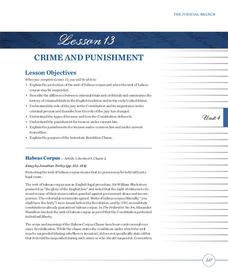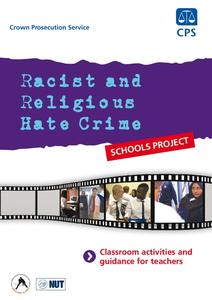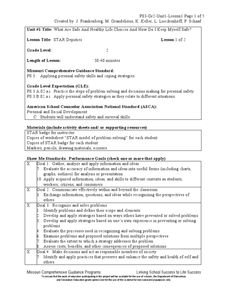Heritage Foundation
Crime and Punishment
You wouldn't give someone a 10-day timeout for eating a piece of candy. The US government, too, does not believe in unreasonable punishment. A variety of exercises exploring the clauses of the US Constitution prompts class members to...
Curated OER
Evaluating Crimes
What is crime? Discriminate between criminal and non-criminal behavior with your scholars by engaging them in potentially heated discussion about various scenarios. A brief definition of the word crime precedes individual analysis of 15...
Crown Prosecution Service
Racist and Religious Hate Crime
Address the current political climate with a series of thought-provoking activities. A resource packet provides pupils with strategies for challenging racist behavior and religious prejudice, and moves them from being passive bystanders...
BBC
Crime
Crime and punishment! Learners discuss the law, civics, and crime in the UK. They brainstorm lists of crimes and possible punishments, complete activities on a website, role-play a Juvenile Court scenario, and try to think of ways they...
Curated OER
Society Dominos
Students examine six victims of a crime. They role play characters in the scenario and relate feelings as the scene develops. they brainstorm and role play strategies to increase understanding of the rights and responsibilities of...
College Board
2011 AP® Microeconomics Free-Response Questions Form B
What could be the link between a college education and reduced crime rates? Learners consider the question using authentic College Board materials. Other practice sets examine the effects of price and competition in various case studies.
US Institute of Peace
Simulation on The Cambodia Peace Settlement
Can there be peace in Cambodia? Immerse your class in a realistic negotiation setting during a riveting simulation. Learners assume the roles of key players in a group sparring with an opposing group to try to achieve peace in the midst...
Curated OER
Congressional Scenarios
In this U.S. government worksheet, students read 12 scenarios pertaining to government intervention and determine what to do as lawmakers in response to each of the scenarios.
Curated OER
STAR Deputies
Second graders engage in a lesson that is about the sharing of following rules to follow the law. They concentrate on the making of safe choices. Students use the examples to have class discussion. They also role play scenarios of making...
Curated OER
Society Dominoes
Pupils are introduced to six victims of a crime. They role play characters in the scenario and discuss feelings as the scene unfolds. Through brainstorming and role playing strategies, they increase their understanding of the rights of...
Curated OER
The Case of Similar Substances
Students solve a crime mystery using chemical tests. They review the crime scenario and then become familiar with the procedure and results for two tests used to identify unknown powders. They perform the tests on the crime samples and...
Curated OER
Knife crime and sentencing
Students discuss their feelings about kids carrying knives and whether or no people who carry knives should be punished just as much as people who carry guns. Students study what a fixed penalty is, the dangers of kids carrying knives,...
Curated OER
Encouraging Citizenship
Tenth graders are given the scenario and are asked questions concerning a crime. They answers to the questions are used to develop a debate. Each question is intended to promote higher thinking skills like analysis and ask the student to...
Curated OER
Stereotypes
Assumptions and misconceptions are two things that underlie stereotypes. Introduce youngsters to the concept of stereotyping with a role-play activity. They pretend they are employees at a restaurant who have accused a person of...
Curated OER
What is Terrorism?
Spark what's sure to be an interesting discussion in your classroom by introducing the topic of terrorism. Consider the meaning of the word terrorism and examine the associated connotations with a brief introductory reading. With your...
Curated OER
Arrests and Investigatory Stops
Students define arrest and detainment, examine hypothetical situations to determine if warrantless arrest/detainment is reasonable based on information available to police, discuss differences between hunch, suspicion, reasonable...
Curated OER
Restorative Justice
Sixth graders study restorative justice. In this government activity, 6th graders discuss restorative justice, examine the ways restitution can be made when a crime occurs, and write about a conflict at home or school and describe how it...
Curated OER
AFGHANISTAN IN RUINS
Students explore the meaning of the term global interdependence, why rich countries help poorer countries, and match types of international aid to their scenarios.
Curated OER
Search & Seizure Opinion Poll
Students examine federal and state constitutional law relating to search and seizure. They analyze various scenarios, participate in an opinion poll, and discuss difficulties in balancing individual privacy rights with the need to fight...
Curated OER
Let's Put a Spin on Things: Graffiti Role Play
Fourth graders examine what is and what isn't graffiti. They role-play various scenarios, research the Graffiti Hurts website, and discuss when graffiti should be reported to local law enforcement.
Curated OER
Shoplifting Simulation
Learners distinguish between grand and petty larceny. They become aware of the individual rights of minors and explain the procedures of a closed juvenile hearing. They realize the severity of the crime of shoplifting.
Curated OER
Examining The Doctrine of Command Responsibility
Students identify the elements of the Doctrine of Command Responsibility and assess the law's application in the Ford v. Garcia case. Evaluate the law's viability in trying international war crimes.
Curated OER
Afghanistan in ruins
Students think about and internalize how they would help to rebuild a country. They study the meaning of global interdependence and why rich countries help poor countries. They also explore different types of international aid and...
Curated OER
Rights of the Accused in Search and Seizure
High schoolers explain the rationale behind the Fourth Amendment, and the types of activity regulated by the Constitution. They analyze situations, and explain a citizen's rights when an unlawful search or seizure is conducted.
Other popular searches
- Homicide Crime Scenarios
- Robbery Crime Scenarios
- Crime Scenarios Fingerprint
- Hate Crime Scenarios
- Factual Crime Scenarios
- Rape Crime Scenarios
- Crime Scenarios on Science
- Crime Scenarios With Guns
- Homoicide Crime Scenarios
- Crime Scenarios Shooting
- Computer Crime Scenarios

























